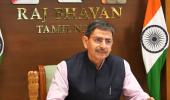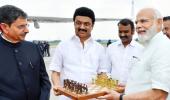Governors must be impartial, fair, and above narrow politics to uphold the values and spirit of the Constitution.
But in a rapidly changing political culture where the unstated rule is to crush the Opposition, such values have no meaning.
At stake are Constitutional values, federalism and governance, asserts Ramesh Menon.

Friction and differences between the governor and the chief minister in non-BJP-ruled states are the new norm.
Why are governors going beyond their Constitutional standards and making governance difficult for these states?
Why are democratic traditions and norms not respected? Why are they throwing away the dignity that the office had earlier?
These questions hang in the air as more and more instances of bureaucratic delay and high-handedness surface.
It is not a freak phenomenon. It is deliberate.
Anyone's guess is whether it is encouraged by the BJP-run Narendra D Modi government, as the governors have yet to be pulled up or told to mend relations with the chief ministers.
In states with a non-BJP government, there has been ugly spats between the governor and the chief minister.
It stands out in the political firmament of India when you compare it to BJP-ruled states where there is peace, respect and harmony between the governor and chief minister.
However, when the Congress was in power, it also misused the office of the governor in non-Congress-ruled states to needle the chief minister. Or even dismiss it as they did with N T Rama Rao in Andhra Pradesh when Indira Gandhi was prime minister.

In states where the BJP has a majority, like Gujarat, Madhya Pradesh, Uttarakhand, Goa and Uttar Pradesh, there is harmony between the governor and the chief minister. Peace personified.
Nor is there any disagreements in states where the BJP is part of a coalition government. No wonder it seems to the man on the street that the centre is igniting the trouble in states where it failed to capture power.
Even the Supreme Court caustically remarked that it did not agree with the actions of then Maharastra governor Bhagat Singh Koshyari in inviting the breakaway faction of the Shiv Sena headed by Eknath Shinde that tied up with the BJP to form a government last year.
Interestingly, since Shinde took over as chief minister along with Devendra Fadnavis of the BJP as the deputy chief minister, there has been no spat between them and the governor (now Ramesh Bais).
Earlier, after the 2019 assembly elections, when there was a hung assembly with no party having a majority, Koshyari hurriedly got Fadnavis sworn in as chief minister in the early morning hours that seemed stealthily done as he did not have a majority.
It was no surprise when Fadnavis resigned within hours, realising that he could not pull it off. Then, a coalition government headed by the Shiv-Sena with Uddhav Thackeray as the chief minister took over that had the support of the National Congress Party and the Congress.
When Shinde's Shiv Sena and the BJP formed a coalition after engineering a split in the Shiv Sena, Koshyari was quick to bless it.
In a recent observation, the Supreme Court invalidated the Maharashtra governor's decision asking Uddhav Thackeray to face the floor test in June last year. However, it said it could not reinstall him as chief minister, as he had voluntarily resigned instead of fighting it out politically.
Koshyari feebly reacted to the court observation by saying he had done what he thought best at that time.

One of the most visible conflicts between the governor and the chief minister has been in Delhi. Consecutive lieutenant governors put a spanner into the works of the Aam Aadmi Party government by delaying decisions and not allowing files to faster.
Even decisions like sending Delhi government school teachers to Finland for training were not given on time when it is well known that Finland has a robust education system and holistic learning in schools.
Chief Minister Arvind Kejriwal was not permitted to attend an international conference in Singapore where he was to talk about the Delhi model of governance and the work done in areas like education, health, and power. Current Lieutenant Governor V K Saxena defended his decision, saying that mayors would be attending and it would not befit a chief minister.
A chance to showcase a positive example that was working in India was lost because of petty politics.
Kejriwal has repeatedly alleged that the LG was obstructing important Delhi government schemes.
When the Supreme Court ruled that the AAP government in Delhi had the power to run services in the national capital, the Centre brought in an ordinance overturning the judgment and restoring powers to itself.
This would directly reduce the chief minister's powers and give more authority to the Centre-appointed lieutenant governor in making decisions in the city-state.
In one case, the lieutenant governor sent a recovery notice to Chief Minister Kejriwal, saying money spent on propaganda had to be recovered from the AAP.
In BJP-governed states like Gujarat, Uttar Pradesh, Uttarakhand, and Madhya Pradesh, which splash its programmes its populist programmes on lavish newspaper spreads and hoardings, no such objections or recovery notices have were raised by the governors of these states.
The LG has constituted inquiry committees for several Delhi government schemes that helped AAP ride to power in two consecutive elections.

It is no different in other Opposition-run states.
In Tamil Nadu, there has been friction between Governor R N Ravi and Chief Minister M K Stalin who heads the DMK-led coalition, the Secular Progressive Alliance.
Ravi wanted the name of the state changed to Tamizhgam. All parties were against this.
Ravi also defied convention and omitted passages in his prepared speech by the government praising late DMK stalwarts like C N Annadurai and M Karunanidhi and Dravidian ideologue, 'Periyar' E V Ramasamy Naicker.
Convention has it that the governor will keep the address the same to the state legislature as it would be a statement that the government wants to convey.
He was also delaying the passing of bills passed by the legislature.
DMK MPs have briefed President Droupadi Murmu about how Ravi violated Constitutional norms.
As we have seen elsewhere, the Centre wants to install vice-chancellors with a right-wing background in state-run universities.
In Kerala, Governor Arif Mohammed Khan, one fine day, decided to ask all the vice-chancellors of nine universities to resign. It hardly came as a surprise.
Chief Minister Pinarayi Vijayan said that Khan had no such power. It was interference in higher education, and doing this without even talking to the VCs was unilateral. Even if a VC had to be removed, a procedure was in place but it was not followed.
That is not all. Vijayan has pointed out how the Governor had not signed bills passed by the state assembly and how 11 ordinances lapsed due to it.
Khan has also passed caustic remarks against ministers and even held press conferences to attack the elected government for violating norms that governors usually follow. The President has not pulled him up for his questionable actions.

Vice President Jagdeep Dhankar, who was earlier the governor of West Bengal, had numerous run-ins with Chief Minister Mamata Banerjee. Both of them openly attacked each other, not caring to hold their punches.
Dhankar started tweeting critiques of the Trinamool Congress government soon after taking over as governor.
Banerjee blocked him on Twitter and wrote to him that it was his Constitutional obligation to support the state government.
But as his public criticism continued to badger her government, she reminded him in a letter that he was an executive nominee of the President while she was an elected representative.
Without mincing words, she said that he should act within the mandates of the Constitution and refrain from acting on a political order to destabilise a democratically elected government.
In Punjab, the Aam Aadmi Party government had to approach the Supreme Court to direct Governor Banwarilal Purohit to summon the budget session as he refused to heed Chief Minister Bhagwant Mann's request.
Besides, he has turned down recommendations of appointments to the vice-chancellor's post that Mann suggested.
Telangana Chief Minister K Chandrashekar Rao of the Bharat Rashtra Samiti alleged that Governor Tamilisai Soundarajan, who was a former BJP leader in Tamil Nadu, was probably involved in BJP efforts to poach his party MLAs and destabilise the government. Soundarajan reacted by saying that somebody was perhaps tapping her phone.
In other states like Chhattisgarh and Jharkhand, where the BJP is not in power, there has been friction between the governor and the chief minister, affecting governance.
It is a serious issue as people ultimately pay the price.
Governors must be impartial, fair, and above narrow politics to uphold the values and spirit of the Constitution.
But in a rapidly changing political culture where the unstated rule is to crush the Opposition and stop it from flourishing in the states where it is not in power, such values have no meaning.
At stake are Constitutional values, federalism and governance.
Ramesh Menon, award-winning journalist, educator, documentary film-maker and corporate trainer, is the author of Modi Demystified: The Making Of A Prime Minister.
Feature Presentation: Aslam Hunani/Rediff.com










